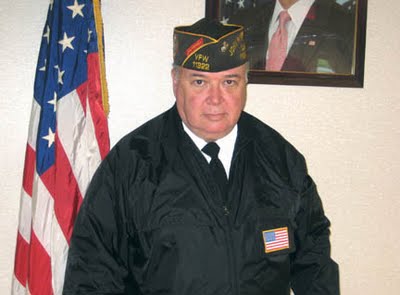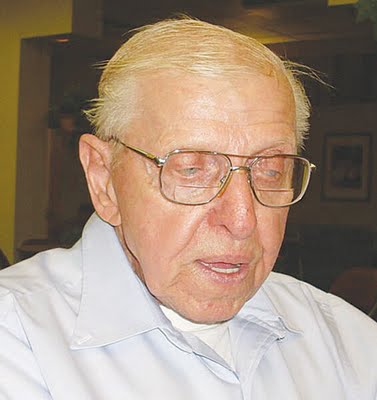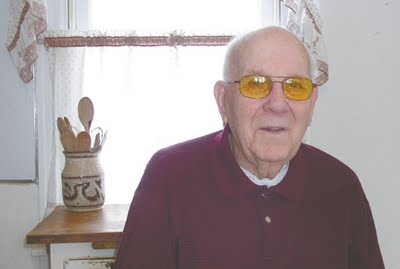John F. Sandle
Ex-Marine knows a thing or two about dedication and sacrifice.
By R. Kurt Osenlund, BucksLocalNews.com

Former Marine and Perkasie resident John Sandle has a natural inclination to help others, which he admits has sometimes gotten him into trouble. An outwardly stoic man, but one with a clearly emotional center, Sandle, 64, says he tries hard to focus on positive things and leave bad memories in the past, but he does make it a point to mention that he was stabbed five times and shot once, all before graduating from Bloomfield Tech High School in Essex County, N.J. At least two of the incidents came as a result of Sandle attempting to help a stranger, and when Sandle told his father he was interested in joining the Marine Corps, the response he got was plain and simple: “There are two things the Marines can teach you better than I can,” his father, Frederick, told him, “defending yourself and running away.”
Sandle did little of the latter throughout his military career, which began on Nov. 5, 1963 when he was still a senior in high school. He says he was the first guy in his class to go into the service and, as far as he knows, the fourth guy in his class to ultimately go to Vietnam. Sandle first enlisted with the Marine Corps Reserves, unable to jump right into active duty given his status as the sole surviving son of a WWII Army veteran. After appealing to the right people, Sandle was able to dodge the restriction, but before deploying he stayed home to tend to his father as he battled cancer. When Sandle was 19, his father passed away, and he reported to Camp Lejeune in North Carolina.
With his basic training already complete, Sandle stepped in as an armor, test-firing and repairing weapons. At roughly the same time, his wife Sandra, whom he’d married in 1966, gave birth to his son, Todd. And when Todd was one month old, Sandle received orders for Vietnam, one of many instances in which he’d be forced to choose work over family.
“I knew I had a job to do and I knew I’d be going [to Vietnam] eventually, but it was unfortunate it had to happen right then,” Sandle says.
Sandle first reported to Okinawa, where he initially spent much of his time as a file clerk while waiting for the recuperation of his left ear, which he injured by not wearing protective gear while test-firing weapons (to this day, the ear has never recovered, says Sandle, who’s 85 percent deaf in his left ear and 50 percent deaf in his right – the result of another injury in Southeast Asia). For the unit in Okinawa, his mission eventually became to repair all Marine Corps weapons in Southeast Asia, from handguns to tanks, and to send teams of men into Vietnam to repair weapons in the field.
During his 13-month stay in Okinawa, Sandle’s second child, Pam, was born, and when he was reassigned to California’s Camp Pendleton, serving as a troop handler and pre-deployment instructor and training men who were bound for Vietnam, the workload began to take its toll on his family.
“It was long, hard work,” Sandle says. “We worked six-and-a-half days per week for 19 months straight. That’s why I ended up getting a divorce. I think I had seven days off in 19 months. But it was a job that had to be done.”
In 1970, when his wife finalized the divorce, Sandle signed a waiver to volunteer to go back to Vietnam. He served as company administration chief and platoon sergeant. When asked if he saw much action, Sandle says “not really” and “I saw enough” before revealing that, at one point, he inadvertently killed a 14-year-old native boy, who’d been holding a gun on him, and whom he meant to knock out with his weapon but accidentally shot.
“It’s not something I’m proud of,” Sandle says with genuine remorse.
Sandle was soon assigned to the 2nd Battalion 5th Marines, the most highly decorated battalion in the Marine Corps, and then to 1st Battalion 11th Marines, where he was promoted to Staff Sergeant. Soon after that he met his second wife, Kate, whom he married on Nov. 4 1972 – one day shy of his anniversary of joining the Marine Corps. In 1976 he was transferred to a Marine brigade in Hawaii, where he served as a casualty officer. In 1979 he transferred to Washington, D.C., where he worked closely with NATO and SEATO and where, he says, he was involved with the legislation of the Defense Officer Personnel Management Act (DOPMA), which stabilized officer manpower throughout the services.
He eventually ended up back at Camp Pendleton, where his duties included the out-processing and discharging of Marine Corps personnel. He says he discharged about 40,000 people in 3 years and devised a way to save $1.4 million in administration costs via simple things like reduced paperwork. He received a Navy Achievement Medal for his efforts.
Sandle retired in 1988, went to work for the now-defunct Globe Security in Philadelphia, and was then called back to active duty to serve in Desert Storm. When he was sent home once more, he worked for the Department of Agriculture, then a mortgage processing firm. He’d later work for a security company and postal service, but not before a pursuing a degree in criminal justice at Allentown College, which he’d have to forgo to take care of his dying mother and stepfather.
In 2003, Sandle split with his second wife, with whom he had a daughter, Kristen. In 2007, he remarried again, this time to Phyllis, whom he’s still with today. In the Marines, he says he learned the value of growing up in America, to respect people of all walks of life and, of course, helpfulness, work ethic and sacrifice.
“John F. Kennedy, when he was sworn in, stated, ‘Ask not what your country can do for you, but what you can do for your country,’” says Sandle, who’s also commander of the Guardians of the Washington Crossing National Cemetery. “I have that on a plaque on my desk, followed up with the quote, ‘I can, I have and I will.’”
By R. Kurt Osenlund, BucksLocalNews.com

Former Marine and Perkasie resident John Sandle has a natural inclination to help others, which he admits has sometimes gotten him into trouble. An outwardly stoic man, but one with a clearly emotional center, Sandle, 64, says he tries hard to focus on positive things and leave bad memories in the past, but he does make it a point to mention that he was stabbed five times and shot once, all before graduating from Bloomfield Tech High School in Essex County, N.J. At least two of the incidents came as a result of Sandle attempting to help a stranger, and when Sandle told his father he was interested in joining the Marine Corps, the response he got was plain and simple: “There are two things the Marines can teach you better than I can,” his father, Frederick, told him, “defending yourself and running away.”
Sandle did little of the latter throughout his military career, which began on Nov. 5, 1963 when he was still a senior in high school. He says he was the first guy in his class to go into the service and, as far as he knows, the fourth guy in his class to ultimately go to Vietnam. Sandle first enlisted with the Marine Corps Reserves, unable to jump right into active duty given his status as the sole surviving son of a WWII Army veteran. After appealing to the right people, Sandle was able to dodge the restriction, but before deploying he stayed home to tend to his father as he battled cancer. When Sandle was 19, his father passed away, and he reported to Camp Lejeune in North Carolina.
With his basic training already complete, Sandle stepped in as an armor, test-firing and repairing weapons. At roughly the same time, his wife Sandra, whom he’d married in 1966, gave birth to his son, Todd. And when Todd was one month old, Sandle received orders for Vietnam, one of many instances in which he’d be forced to choose work over family.
“I knew I had a job to do and I knew I’d be going [to Vietnam] eventually, but it was unfortunate it had to happen right then,” Sandle says.
Sandle first reported to Okinawa, where he initially spent much of his time as a file clerk while waiting for the recuperation of his left ear, which he injured by not wearing protective gear while test-firing weapons (to this day, the ear has never recovered, says Sandle, who’s 85 percent deaf in his left ear and 50 percent deaf in his right – the result of another injury in Southeast Asia). For the unit in Okinawa, his mission eventually became to repair all Marine Corps weapons in Southeast Asia, from handguns to tanks, and to send teams of men into Vietnam to repair weapons in the field.
During his 13-month stay in Okinawa, Sandle’s second child, Pam, was born, and when he was reassigned to California’s Camp Pendleton, serving as a troop handler and pre-deployment instructor and training men who were bound for Vietnam, the workload began to take its toll on his family.
“It was long, hard work,” Sandle says. “We worked six-and-a-half days per week for 19 months straight. That’s why I ended up getting a divorce. I think I had seven days off in 19 months. But it was a job that had to be done.”
In 1970, when his wife finalized the divorce, Sandle signed a waiver to volunteer to go back to Vietnam. He served as company administration chief and platoon sergeant. When asked if he saw much action, Sandle says “not really” and “I saw enough” before revealing that, at one point, he inadvertently killed a 14-year-old native boy, who’d been holding a gun on him, and whom he meant to knock out with his weapon but accidentally shot.
“It’s not something I’m proud of,” Sandle says with genuine remorse.
Sandle was soon assigned to the 2nd Battalion 5th Marines, the most highly decorated battalion in the Marine Corps, and then to 1st Battalion 11th Marines, where he was promoted to Staff Sergeant. Soon after that he met his second wife, Kate, whom he married on Nov. 4 1972 – one day shy of his anniversary of joining the Marine Corps. In 1976 he was transferred to a Marine brigade in Hawaii, where he served as a casualty officer. In 1979 he transferred to Washington, D.C., where he worked closely with NATO and SEATO and where, he says, he was involved with the legislation of the Defense Officer Personnel Management Act (DOPMA), which stabilized officer manpower throughout the services.
He eventually ended up back at Camp Pendleton, where his duties included the out-processing and discharging of Marine Corps personnel. He says he discharged about 40,000 people in 3 years and devised a way to save $1.4 million in administration costs via simple things like reduced paperwork. He received a Navy Achievement Medal for his efforts.
Sandle retired in 1988, went to work for the now-defunct Globe Security in Philadelphia, and was then called back to active duty to serve in Desert Storm. When he was sent home once more, he worked for the Department of Agriculture, then a mortgage processing firm. He’d later work for a security company and postal service, but not before a pursuing a degree in criminal justice at Allentown College, which he’d have to forgo to take care of his dying mother and stepfather.
In 2003, Sandle split with his second wife, with whom he had a daughter, Kristen. In 2007, he remarried again, this time to Phyllis, whom he’s still with today. In the Marines, he says he learned the value of growing up in America, to respect people of all walks of life and, of course, helpfulness, work ethic and sacrifice.
“John F. Kennedy, when he was sworn in, stated, ‘Ask not what your country can do for you, but what you can do for your country,’” says Sandle, who’s also commander of the Guardians of the Washington Crossing National Cemetery. “I have that on a plaque on my desk, followed up with the quote, ‘I can, I have and I will.’”
 RSS Feeds
RSS Feeds





